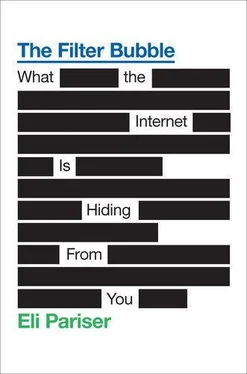52–53 “these documents are forgeries”:Peter Wallsten, “‘Buckhead,’ Who Said CBS Memos Were Forged, Is a GOP-Linked Attorney,” Los Angeles Times, Sept. 18, 2004, accessed Dec. 11, 2010, http://seattletimes.nwsource.com/html/nationworld/2002039080_buckhead18.html.
53 “We should not have used them”:Associated Press, “CBS News Admits Bush Documents Can’t Be Verified,” Sept. 21, 2004, accessed Dec. 11, 2010, www.msnbc.msn.com/id/6055248/ns/politics.
54 paying attention to the story: The Gallup Poll: Public Opinion 2004 (Lanham, MD: Rowman & Littlefield, 2006), http://books.google.com/books?id=uqqp-sDCjo4C&pg=PA392&lpg=PA392&dq=public+opinion+poll+on+dan+rather+controversy&source=bl&ots=CPGu03cpsn&sig=9XT-li8ar2GOXxfVQWCcGNHIxTg&hl=en&ei=uw_7TLK9OMGB8gb3r72ACw&sa=X&oi=book_result&ct=result&resnum=1&ved=0CBcQ6AEwAA#v=onepage&q=public%20opinion%20poll%20on%20dan%20rather%20controversy&f=true.
54 “a crisis in journalism”:Lippmann, Liberty and the News, 64.
56 at this point that newspapers came to carry:This section was informed by the wonderful Michael Schudson, Discovering the News: A Social History of American Newspapers (New York: Basic Books, 1978).
57 “They goose-stepped it”:Lippmann, Liberty and the News , 4.
57 “what [the average citizen] shall know”:Ibid., 7.
58 “distinctive member of a community”:John Dewey, Essays, Reviews, and Miscellany, 1939–1941, The Later Works of John Dewey, 1925–1953, vol. 2 (Carbondale: Southern Illinois University Press, 1984), 332.
59 calls the 2000s the disintermediation decade:Jon Pareles, “A World of Megabeats and Megabytes,” New York Times, Dec. 30, 2009, accessed Dec. 11, 2010, www.nytimes.com/2010/01/03/arts/music/03tech.html.
59 Disintermediation —the elimination of middlemen:Dave Winer, Dec. 7, 2005, Dave Winer’s blog, Scripting News , accessed Dec. 11, 2010, http://scripting.com/2005/12/07.html#.
59 “It sucks power out of the center”:Esther Dyson, “Does Google Violate Its ‘Don’t Be Evil’ Motto?,” Intelligence Squared US. Debate between Esther Dyson, Siva Vaidhyanathan, Harry Lewis, Randal C. Picker, Jim Harper, and Jeff Jarvis (New York, NY) Nov. 18, 2008, accessed Feb. 7, 2011, www.npr.org/templates/story/story.php?storyId=97216369.
60 the Latin for “middle layer”:Hat tip to Clay Shirky for introducing me to this fact in his conversation with Jay Rosen. Clay Shirky interview by Jay Rosen, video, chap. 5 “Why Study Media?” NYU Primary Sources (New York, NY), 2011, accessed Feb 9, 2011, http://nyuprimarysources.org/video-library/jay-rosen-and-clay-shirky/.
61 “many wresting power from the few”:Lev Grossman, “Time’s Person of the Year: You,” Time, Dec. 13, 2006, accessed Dec. 11, 2010, www.time.com/time/magazine/article/0,9171,1569514,00.html.
61 “did not eliminate intermediaries”:Jack Goldsmith and Tim Wu, Who Controls the Internet? Illusions of a Borderless World (New York: Oxford University Press, 2006), 70.
62 “It will remember what you know”:Danny Sullivan, “Google CEO Eric Schmidt on Newspapers & Journalism,” Search Engine Land, Oct. 3, 2009, accessed Dec. 11, 2010, http://searchengineland.com/google-ceo-eric-schmidt-on-newspapers-journalism-27172.
62 “bringing the content to the right group”:“Krishna Bharat Discusses the Past and Future of Google News,” Google News blog, June 15, 2010, accessed Dec. 11, 2010, http://googlenewsblog.blogspot.com/2010/06/krishna-bharat-discusses-past-and.html.
62 “We pay attention”:Ibid.
63 “most important, their social circle”:Ibid.
63 “make it available to publishers”:Ibid.
63 Americans lost more faith in news:“Press Accuracy Rating Hits Two Decade Low; Public Evaluations of the News Media: 1985–2009,” Pew Research Center for the People and the Press, Sept. 13, 2009, accessed Dec. 11, 2010, http://people-press.org/report/543/.
64 “ New York Times and some random blogger”:Author’s interview with Yahoo News executive. Sept. 22, 2010. This interview was conducted in confidence.
65 unplugging from cable TV offerings:Erick Schonfeld, “Estimate: 800,000 U.S. Households Abandoned Their TVs for the Web,” TechCrunch blog, Apr. 13, 2010, accessed Dec. 11, 2010, http://techcrunch.com/2010/04/13/800000-households-abandoned-tvs-web; “Cable TV Taking It on the Chin,” www.freemoneyfinance.com/2010/11/cable-tv-taking-it-on-the-chin.html; and Peter Svensson, “Cable Subscribers Flee, but Is Internet to Blame?” http://finance.yahoo.com/news/Cable-subscribers-flee-but-is-apf-3875814716.html?x=0.
65 “change the ad industry forever”:“Google Vice President: Online Video and TV Will Converge,” June 25, 2010, Appmarket.tv, accessed Dec. 11, 2010, www.appmarket.tv/news/160-breaking-news/440-google-vice-president-online-video-and-tv-will-converge.html.
66 know people who live near us:Bill Bishop, The Big Sort: Why the Clustering of Like-Minded America Is Tearing Us Apart (New York: Houghton Mifflin, 2008), 35.
67 “watch television to turn your brain off”:Jason Snell, “Steve Jobs on the Mac’s 20th Anniversary,” Macworld, Feb. 2, 2004, accessed Dec. 11, 2010, www.macworld.com/article/29181/2004/02/themacturns20jobs.html.
67 thirty-six hours a week:“Americans Using TV and Internet Together 35% More Than a Year Ago,” nielsenwire, Mar. 22, 2010, accessed Dec. 11, 2010, http://blog.nielsen.com/nielsenwire/online_mobile/three-screen-report-q409.
68 quit channel surfing far more quickly:Paul Klein, as quoted in Marcus Prior, Post-Broadcast Democracy (New York: Cambridge University Press, 2007), 39.
68 like your own personal TV channel:“YouTube Leanback Offers Effortless Viewing,” YouTube blog, July 7, 2010, accessed Dec. 11, 2010, http://youtube-global.blogspot.com/2010/07/youtube-leanback-offers-effortless.html.
69 onto the Big Board, and you’re liable to get a raise:Ben McGrath, “Search and Destroy: Nick Denton’s Blog Empire,” New Yorker, Oct. 18, 2010, accessed Dec. 11, 2010, www.newyorker.com/reporting/2010/10/18/101018fa_fact_mcgrath?currentPage=all.
70 “come to us for our judgment”:Jeremy Peters, “Some Newspapers, Tracking Readers Online, Shift Coverage,” New York Times, Sept. 5, 2010, accessed Dec. 11, 2010, www.nytimes.com/2010/09/06/business/media/06track.html.
71 gin up stories that will get clicks:Danna Harman, “In Chile, Instant Web Feedback Creates the Next Day’s Paper,” Christian Science Monitor, Dec. 1, 2004, accessed Dec. 11, 2010, www.csmonitor.com/2004/1201/p01s04-woam.html.
71 “creating content in response to audience insight”:Jeremy Peters, “At Yahoo, Using Searches to Steer News Coverage,” New York Times, July 5, 2010, accessed Dec. 11, 2010, www.nytimes.com/2010/07/05/business/media/05yahoo.html.
72 the newspaper’s most e-mailed stories:Jonah A. Berger and Katherine L. Milkman, “Social Transmission and Viral Culture,” Social Science Research Network Working Paper Series (Dec. 25, 2009): 2.
Читать дальше











